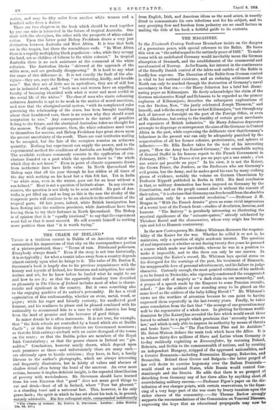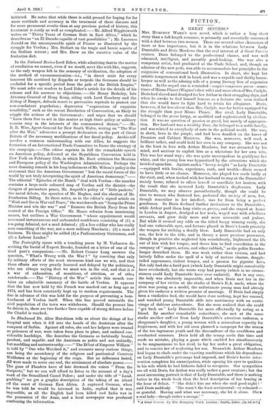THE MAGAZINES.
Ix the Nineteenth Century Professor Hearnshaw insists on the dangers of a premature peace, with special reference to the Baltic. He bases this view on " the awful sequel to the untimely peace of 1802." To make terms with an undefeated Germany would inevitably mean the German absorption of Denmark, and the establishment of the commercial and naval control of Norway. As for Russia, her interest in the continuance of the friendly Danish control of the inlets and outlets of the Baltic is hardly less supreme. The liberation of the Baltic from German control is vital to her national existence, and an enduring settlement of the North can only be reached through the destruction of Germany's naval ascendancy in that sea.—Sir Harry Johnston has a brief but illumi- nating paper on Kilimanjaro. He freely acknowledges the claim of the German missionaries ICrapf and Rebmann to be regarded as the pioneer explorers of Kilimanjaro; describes the subsequent explorations of von der Decken, New, "the justly celebrated Joseph Thomson," and himself; and tells the story of how we lost Kilimanjaro, "not through any lack of interest or foresight on the part of the Foreign Office, or even of Mr. Gladstone, but owing to the timidity of certain great merchants and organizers of British industries." Sir Harry Johnston deprecates attempts to disparage or misrepresent the aims of the Germans in Central Africa in the past, while expressing the deliberate view that Germany's behaviour in the present war can only be adequately punished by tho sequestration of all her former colonies, protectorates, and spheres of influence.—Mr. Ellis Barker takes for the text of his interesting paper, "How the Army has Ruined Germany," the remarkable saying of General Stoffel in his famous report to the French Government in February, 1870: "La Prusse n'est pas un pays qui a une armee ; c'est sine armee qui possede un pays." In his view, it is not the Kaiser, the Crown Prince, the Junkers, or the Professors who are Germany's evil genius, but the Army, and he makes good his case by many striking pieces of evidence, notably the volume on German Chauvinism by Professor Nippold published in Berlin in 1913. His final conclusion is that, as military domination has been imposed on Germany by the Constitution, and as the people cannot alter it without the consent of their rulers, "it is obvious that Germany can free herself from the shackles of militarism only by a successful revolution."—Professor J. H. Morgan in "With the French Armies" gives us some vivid impressions of a recent tour of the French front—studies of desolation, heroism, and humour. "The Battery" is peculiarly interesting as illustrating the mystical significance of the " soixante-quinze," already celebrated by Theodore Botrel and the ehansonniers, whose very origin has become epic and led to Homeric controversy.
In the new Contemporary Mr. Sidney Whitman discusses the responsi- bility of the Kaiser for the war. Whether he willed it or not is, he maintains, only a question of slight academic interest. The question of real importance is whether or not during twenty-five years he pursued a course which made war inevitable, whereas he was in a position to make it impossible, and to this there can only be one answer. In summarizing the Kaiser's record, Mr. Whitman lays special stress on his disregard for the warnings of the past, his treatment of Bismarck, his unappeasable love of personal advertisement, and his failure to judge character. Curiously enough, the most pointed criticism of his methods is to be found in Treitschke, who vigorouslycondemned the exaggerated theocratical cult of majesty as "a dark stain on our monarchy," and, d propos of a speech made by the Emperor to some Prussian recruits, asked : "Are the soldiers of our standing army to be placed on the same level as the soldiers of the baby-killing Herod ? " Mr. Whitman's views are the worthier of attention because he can point to having expressed them repeatedly in the last-twenty years. Finally, ho takes some consolation from the fact that "the scourge of one generation may well be the regenerator of a whole race. In plotting for German world- dominion he [the Kaiser] has revealed the fate which would await those forced to submit to a people which proclaims that 'necessity knows no law,' and which is only able to impress its authority by means of threats and brute force."—In "The Pan-German Plan and its Antidote" Mr. Seton-Watson defines the main task which faces the Allies. It is to release thirty-five millions of Slays and Latins whom Germany, is to-day ruthlessly exploiting as Kanonenfutter, by restoring Poland, Bohemia, and Serbia to the commonwealth of nations, and by creating an independent Hungary, stripped of the oppressed nationalities, and a Greater Roumania—including Roumanian Hungary, Bukovina, and Bessarabia. Behind these Greece and Bulgaria—the latter purged of her evil desire to exercise hegemony over the Balkan Peninsula— would stand as national States, while Russia would control Con- stantinople and the Straits. He adds that there is no prospect of detaching from Germany any of her three allies by anything short of overwhelming military success.—Professor Pigon's paper on the dig. tribution of war charges points, with certain reservations, to the finan- cing of a very large part of the war costa by heavy taxation upon the richer classes of the community.—Sir Thomas Barlow strongly supports the recommendations of the Commission on Venereal Diseases, expressing the hope that an educational propaganda may now be
initiated. He notes that while there is solid ground for hoping for far more certitude and accuracy in the treatment of these diseases and for more permanent results than at any previous period of history, this treatment is costly as well as complicated.—Mr. Alfred Wigglesworth writes on "Thirty Years of German Rule in East Africa," which he describes as "an El Dorado capable of vast possibilities " ; Mr. Laurence Jerrold on the unconquerable spirit of France as illustrated by the struggle for Verdun ; Mrs. Stobart on the tragic and heroic aspects of the Serbian retreat ; and Mrs. Drew on the curative value of the fruitarian diet.
In the National Review Lord Esher, while admitting that in the matter of retaliation we cannot, even if we would, meet like with like, suggests, as the only weapon left in the armoury of civilization, the adoption of the method of excommunication—i.e., "in direct ratio for every innocent life sacrificed by Zeppelin or torpedo the Germans should be excluded for a specific period from the pale of the British Empire." We must refer our readers to Lord Esher's article for the details of his scheme and his answers to objections.—Sir Henry Berkeley, late Attorney-General of Hong Kong, siding with Lord Rosebery and tho Bishop of Bangor, defends resort to preventive reprisals to protect our non-combatant population ; deprecates "expressions of exquisite sensibility," such as the recent Resolution of Convocation, as likely to cripple the actions of the Government ; and urges that we should "leave them free to act in this matter as high State policy or military reasons may in the interests of the commonweal dictate."—Mr. B. R. Wise, Agent-General for New South Wales, writing on "The War after the War," advocates a prompt declaration on the part of Great Britain of the necessary modifications of her fiscal policy. As this will involve a common understanding with our Allies, he suggests the formation of an International Trade Committee to frame the strategy of the campaign.—The editor reprints in full the remarkable speech on. American policy, delivered at the Republican Convention held in New York on February 15th, in which Mr. Root criticizes the Mexican and European policy of the Washington Administration. Perhaps the most damning remark in his long indictment of Mr. Wilson's policy is the statement that the American Government "lost the moral forces of the world by not truly interpreting the spirit of American democracy."— The editorial "Episodes of the Month" deal with Verdun—the number contains a large-scale coloured map of Verdun and the district—the dangers of premature peace, Mr. Asquith's policy of "little packets," the naval debate, the speeches of Mr. Hughes, and the election of Mr. Pemberton Billing. In these notes, as in the editor's signed article on "Wait and See in War and Peace," the watchwords are "Scrap the Prime Minister and win the war" and "Remove the British Navy from the control of the Foreign Office." Mr. Masse refrains from mentioning names, but outlines a War Government "whose appointment would command instantaneous and unbounded confidence consisting of (1) a sea-going Admiral, not a mud Admiral ; (2) a live soldier who has really seen something of the war, not a mere military Mandarin ; (3) a man of business. To these might be added (4) a Parliamentary Statesman, and (5) a Labour Leader."
The Fortnightly opens with a touching poem by M. Verhaeren de- scribing the burial of Rupert Brooke, founded on a letter of one of the dead poet's companions.—Mr. Robert Crozier Long answers the question, "What's Wrong with the War ? " by asserting that only by military efforts of the most strenuous kind can we win, and that there efforts are very greatly lessened and delayed by the politicians, who are always saying that we must win in the end, and that it is a war of exhaustion, of munitions, of attrition, or of other catchwords.—The "History of the War" article this month con- tains an admirable summary of the battle of Verdun. It appears that the lino now held by the French was marked out as long ago as 1874, and has been constantly kept up to modern requirements. The line in advance of this was held for the purpose of preventing a bom- bardment of Verdun itself. When this line proved untenable the
civil population of the town was withdrawn. Should the present line be driven in, there are two furthcr lines capable of strong defence before the Citadel is reached.
In Blackwood Dr. Alice Hutchison tells us about the doings of her hospital unit when it fell into the hands of the Austrians after the conquest of Serbia. Against all rules, she and her helpers were treated as prisoners of war, were taken from place to place, and endured con- siderable hardships. She describes the Germans as habitually brutal, insolent, and capable, and the Austrians as polite and not unkindly, but muddling and. untrustworthy.—.---" The Debut of Emperor William" is told by "One who Watched it," and recounts many-curions things, one being the ascendancy of the religious and puritanical Countess Waldersee at the beginning of the reign. But no influences lasted. All were made to serve one end, the attainment of absolute power.
The guns of Flanders have of late drowned the voices "From the Outposts," but we can well afford to listen to the account of a day's work of the Somaliland Camel Police ; and under the title of " Land- grabbing " we get a graphic description of the taking of an island off the coast of German East Africa. A captured German, when he was told he would be interned in India, replied that it was impossible, as all the English had been killed and India was in the possession of the Amir, and a local newspaper was produced confirming tho information.



































 Previous page
Previous page